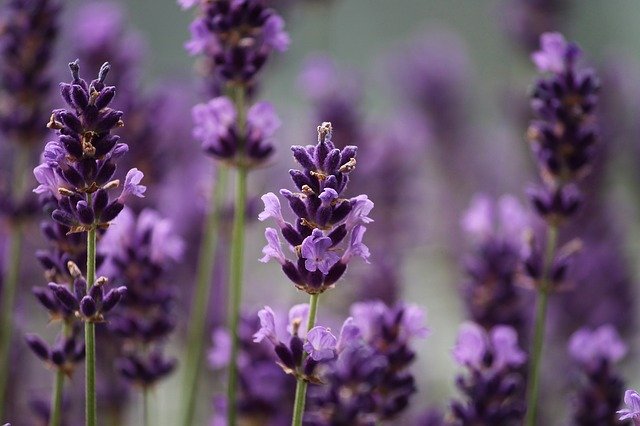What's On This Page
Are you curious about the remarkable benefits of lavender oil for your skin? Wondering how to incorporate this fragrant oil into your skincare routine? Look no further! In this blog post, we’ll uncover the secrets of lavender oil, explore its extraordinary benefits, and show you how to harness its potential for healthy, glowing skin. Say goodbye to ineffective skin care products and discover the natural power of lavender oil. Get ready to transform your skincare routine and discover the wonders of lavender oil.
The skin is the largest organ in your body, so it’s important to care for it and prevent dryness, inflammation, and other issues. Here we share a few of the many benefits of lavender oil for skin to help you keep your complexion fresh and healthy.
Contains Vitamins A & C
Lavender oil contains essential vitamins like A and C, which protect the skin against oxidative stress caused by UVB exposure. These vitamins are essential for human metabolism and contribute to maintaining healthy skin.
Incorporating lavender oil into your skincare routine can provide the benefits of these vitamins, helping to nourish and protect your skin naturally.

Anti-Inflammatory
Lavender oil has been found to have strong anti-inflammatory properties, reducing inflammation and promoting faster healing, minimizing the risk of scarring. This soothing effect has been known since ancient times, as the ancient Egyptians used lavender for its cooling properties on burns.
Fights Bacteria
Lavender oil is a powerful antibacterial agent known for its ability to fight against various types of bacteria, including Staphylococcus aureus, Escherichia coli, and Candida albicans. It can be applied directly to the skin or used on open cuts and wounds to prevent infection, proving particularly effective against “Methicillin-Resistant Staphylococcus Aureus (MRSA)” infections.
Antiseptic
Lavender oil is widely known as an effective natural antiseptic. It is commonly used to treat cuts, burns, and various infections. In addition, lavender oil has been shown to provide relief from conditions such as athlete’s foot.
Has a Soothing Effect
This essential oil is known for its soothing effects on the nerves, making it a popular choice for relieving muscle aches, headaches, and stress. It also effectively reduces tension and promotes relaxation, making it an ideal choice for bedtime or unwinding after a long day.
Combats Acne
Lavender oil is widely known for its effectiveness in fighting acne. It can be applied topically to the skin or added to bath water. One of the reasons for its effectiveness is its ability to regulate sebum production.
Keeps Your Skin Hydrated
Lavender oil is effective against bacteria and is an excellent skin moisturiser. It helps prevent moisture loss, resulting in hydrated and nourished skin. Incorporating lavender oil into your skincare routine can be a soothing and relaxing experience while keeping your skin well-hydrated.
Fight wrinkles
In addition to fighting off bacteria, lavender oil has also been shown to reduce wrinkles’ appearance by promoting hydration in the skin.

Reduces the signs of ageing
Since it’s been shown to reduce wrinkles, decrease sebum production, and fight bacteria, this essential oil is known to be anti-ageing. In addition to that, it also has a toning effect which helps reduce fine lines and wrinkles.
Makes Your Tan Look More Natural
The research mentioned above on fighting bacteria has shown that lavender oil can help your skin look more natural when applied topically. This is because it keeps your skin hydrated and soothes the nerves, preventing premature wrinkling.
Prevents Skin Cancer
Lavender oil has been shown to reduce the likelihood of skin cancer by inhibiting inflammatory markers and promoting the growth of good bacteria in the body. This essential oil is well known for its antiseptic properties, making it great for fighting off bacteria that cause cancer.
Antioxidants
Antioxidants are compounds used in the body to protect cells from oxidative stress caused by sunlight. Lavender oil contains antioxidants that help prevent your skin from ageing and reduce cancer risk.
Combats Cell Damage
One of the main components found in lavender oil, called linalool, has been shown to fight cell damage and decrease ageing signs on the skin. This is because linalool encourages healthy cell growth in the body.

Aromatherapy
In addition to using it topically, lavender oil has a calming effect, making it great for aromatherapy. There are many different kinds of essential oils that you can use for aromatherapy, but lavender is one of the most well-known.
How to Use Lavender Oil for Skin
To use lavender oil effectively for skin care, it is important to follow these guidelines:
- Dilution: lavender oil has a strong fragrance, so it is important to use it sparingly. Apply only a few drops of lavender oil to avoid possible adverse effects.
- Blend: Add drops of lavender oil to the top of your lotion or cream. Be sure to mix thoroughly to distribute the oil evenly.
- Storage: After adding the essential oil to your lotion or cream, store the mixture in a dark, cool, dry place to preserve its quality.
- Patch test: Before applying lavender oil to a large skin area, always perform a patch test. Apply a small amount of the diluted oil to a small skin area and watch for signs of irritation or sensitivity. If adverse reactions occur, discontinue use.
- Hand Hygiene: Because essential oils can make your skin more sensitive, washing your hands thoroughly after use is important to avoid accidental irritation.
- Compatibility: Be careful when using essential oils and avoid applying them near the eyes or mouth to avoid possible discomfort or irritation.
- Cuts and Wounds: If you have cut or wounded yourself, apply a small amount of lavender essential oil to help heal. Allow it to dry before applying any other creams or lotions.
- Dilute with a carrier oil: If lavender oil irritates your skin, mix it with a suitable carrier oil, such as vegetable oil.
- Avoid mixing with certain oils: Avoid combining lavender essential oil with other aromatherapy oils, especially citrus oils, as they may further sensitize your skin to fragrance.
- Use in the bath: If you want to use lavender oil in the bath, make sure you are alone, as the strong scent of the essential oil can irritate the lungs.

Lavender oil may not be suitable for everyone, especially those with high blood pressure, epilepsy, or bleeding disorders. Consult a doctor for concerns or specific medical conditions before using lavender oil.
Using lavender oil and other natural essential oil products can promote healthy skin. Prioritize your skin’s tolerance and choose products that meet your skin’s needs.
What Type of Lavender Oil is Best for Skin
The different types of lavender oil provide different benefits to the skin. Here are the recommended uses for each type:
- Lavandin: This variety is excellent for long-lasting effects and can be applied directly to the skin or in a diffuser. It is best used for lotions, creams and soaps.
- Lavandula Angustifolia: This variety treats burns, cuts and wounds. However, it should be diluted with olive oil before use. It is suitable for all skin applications, including lotions and creams.
When choosing the appropriate type of lavender oil, consider the specific needs of your skin and the desired effects.
How to Store Lavender Oil
Proper storage of lavender oil is important to maintain its quality and effectiveness. Here are the recommended storage methods for different types of lavender oil:
- Lavandin: Store lavandin oil at room temperature. It can be stored for a year or more without significant deterioration.
- Lavandula Angustifolia: To preserve the natural colour of Lavandula angustifolia oil, store it in a dark place. It can be stored at room temperature for up to three years.
By following these storage guidelines, you can ensure the longevity and effectiveness of your lavender oil.
Can you apply lavender oil directly to skin?
Yes, you can apply lavender oil directly to your skin. However, there are some important things to remember when doing so. Essential oils, including lavender oil, are highly concentrated and potent, so it’s important to be careful and take the following precautions:
- Perform a patch test: Before applying lavender oil to a large area of skin, it’s advisable to perform a patch test. Apply a small amount of diluted lavender oil to a small area of the skin and observe for any adverse reactions or skin sensitivity.
- Dilute if necessary: although lavender oil is generally considered safe for direct application to the skin, some people may experience skin irritation or sensitivity. Suppose you have sensitive skin or use lavender oil on a sensitive area. In that case, it’s recommended that you dilute it with a carrier oil such as coconut or almond oil to minimize potential irritation.
- Drug interactions: It’s important to know that certain medications can interact with lavender oil. If you’re taking medication or have a medical condition, it’s advisable to consult a doctor or do thorough research to ensure no possible contraindications.
Applying Lavender Oil Directly to Your Skin
If you apply lavender oil directly to your skin, do a patch test first. This simple step will help you determine how your skin reacts to the essential oil, especially if you have sensitive skin.
To perform a patch test, follow these steps:
- Choose a small area of skin: choose an inconspicuous spot on your body, such as the inside of your forearm or behind your ear.
- Dilute the lavender oil: mix a few drops of lavender oil with carrier oil, such as coconut oil or jojoba oil. This will help reduce concentration and possible irritation.
- Apply the mixture: Gently apply a small amount of the diluted lavender oil to the designated test site. Avoid spreading it on the surrounding skin.
- Watch for reactions: Leave the oil on your skin for at least 24 hours. Watch for signs of redness, itching, irritation, or other negative reactions on the patch during this time.
If you experience discomfort or adverse reactions during the patch test, it is advisable not to apply undiluted lavender oil directly to your skin. However, if your skin shows no signs of sensitivity or irritation, applying the lavender oil externally is generally safe.
Keep in mind that everyone’s skin is different. Therefore, it is important to prioritize your skin’s well-being and adjust your application accordingly. If you have concerns or questions, it’s always a good idea to consult a doctor or aromatherapy expert for personalized advice.
Conclusion
In summary, lavender oil offers numerous benefits for your skin, making it a valuable addition to your skincare routine. Its nourishing, protective and soothing properties promote healthy, glowing skin while it fights acne, relieves various skin problems and reduces signs of ageing.
Before topically applying lavender oil, perform a patch test, dilute the oil if needed, and consider potential drug interactions. These precautions will ensure the safe and effective use of lavender oil.
Say goodbye to ineffective skin care products and embrace the natural wonders of lavender oil. Change your skincare routine and experience its remarkable benefits. Discover the rejuvenating benefits of lavender oil for healthier, glowing skin.
Embrace lavender oil to enhance your skincare routine. Let its natural properties revitalize and improve your skin. Experience the magic of this fragrant oil and unleash your inner beauty.
It’s time to embrace the power of lavender oil and unlock your skin’s true potential.
References
Behmanesh, F., Pasha, H., Sefidgar, A.A., Taghizadeh, M., Moghadamnia, A.A., Adib Rad, H., & Shirkhani, L. (2015). Antifungal Effect of Lavender Essential Oil (Lavandula angustifolia) and Clotrimazole on Candida albicans: An In Vitro Study. Scientifica, 2015. https://pdfs.semanticscholar.org/cdc5/5d49153c281dc50b2c5a5f59b1495c050203.pdf?_gl=11hg0tmk_gaMTYyNDc0NjkwMy4xNjgwNzg1NTI5_ga_H7P4ZT52H5*MTY4NDY5OTM3Ny4xNy4wLjE2ODQ2OTkzODIuNTUuMC4w
Leave a Reply